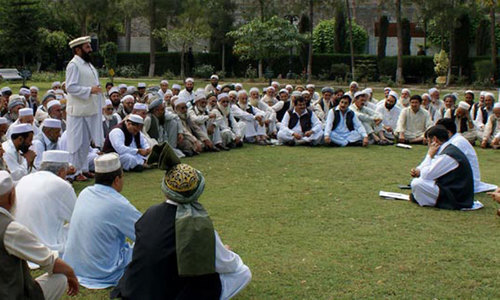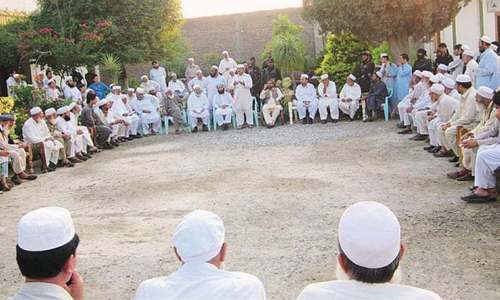HYDERABAD: Rights activists speaking at a programme organised by the local chapter of the Human Rights Commission of Pakistan (HRCP) here on Friday expressed concern over holding of jirgas in Sindh despite the fact that a ban imposed by Supreme Court was in place.
The programme was titled ‘Jirgas in Sindh and judicial system’.
The speakers observed that despite the SC-imposed ban, jirgas continued to take place in various parts of the province.
They noted that females suffered the most as young girls were ordered to be married off to rivals to settle disputes even in as minor a case as theft of goat. A study of the jirgas, if conducted, would reveal that mostly poor families had to suffer due to jirga rulings.
They recalled that the Supreme Court had declared jirgas unconstitutional and illegal. Still, they were being held, they deplored, and said that the root cause of this unlawful activity was existence of the jagirdari system in Sindh. For the common man in rural Sindh, jirga was an alternative to a court of law, they said.
The rights activists noted that many believed that a jirga offered them a quick settlement of disputes or controversies whereas courts of law would take too long to dispense justice.
They stressed that the country’s judicial system must be strengthened and speedy justice ensured in order to discourage jirgas. The judiciary, they said, should take notice of the holding of jirgas in violation of apex court’s orders. The feudal lords carrying on convening jirgas had in fact become “a state within state” where justice was murdered.
They recalled that during the British Raj, community-level disputes used to be settled through jirga-like proceedings where a man or woman was allowed to speak to settle a dispute.
The activists said that society would have to play a positive role to save the poor and womenfolk from forced settlements and unlawful jirgas.
They said jirgas were patronised by waderas (feudal lords) in whose courts the poor were not heard.
They called for a campaign in schools, colleges and universities for creating awareness in society so that people could be stopped from opting for jirgas.
Published in Dawn, February 6th, 2021














































